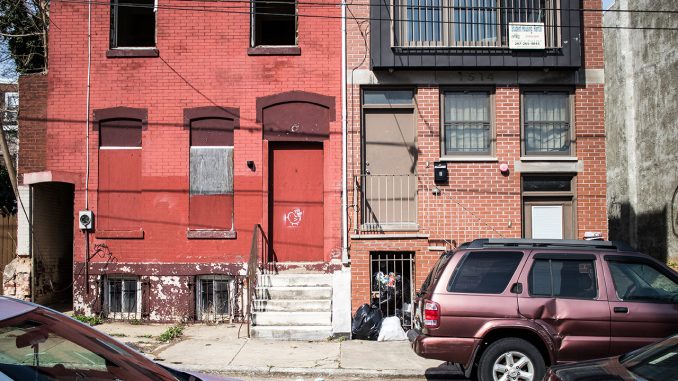
North Philadelphia residents who live near Main Campus are concerned about the effects of gentrification ahead of May’s primary election for City Council’s 5th District seat.
Longtime incumbent and Council President Darrell Clarke now has no challengers for the primary election on May 21 as he seeks to continue in his role as city representative for the area including Main Campus. Clarke’s two opponents from earlier in the Democratic race, Sheila Armstrong and Omar Woodard, dropped out in March, citing a lack of support among community members and Democratic ward leaders on their social media accounts, respectively.
Some community residents believe Clarke uses his seat to propel projects in the district that they oppose, like the new 22nd District police station proposed to open on Diamond Street near 22nd by 2021.
A spokesperson for Clarke could not be reached for comment.
“You have the homeless out here, gentrification is everywhere,” said Jarrell Smith, a 27-year-old library assistant who lives on Susquehanna Avenue near Sydenham Street. “On one hand, gentrification works. On the other hand, it doesn’t. If you have the money to move, it’s nice and it’s great. At the same time, they force people out.”
Between 2000 and 2013, gentrification occurred in 57 census tracts in the city, a number higher than San Francisco and only behind New York, Los Angeles and Washington, D.C., according to a March 2019 report by the National Community Reinvestment Coalition, an association of organizations that promote affordable housing and job creation for working-class people.
The effects have been exacerbated by the 10-year property tax abatement, according to the report. Clarke has earlier vowed to reform the abatement, The Temple News reported. The city first put the abatement into place 22 years ago, allowing property owners to pay zero property taxes on improvements for a 10-year period.
Gail Loney, the block captain for the 2200 block of North Lambert Street and a member of the Stadium Stompers, is not in favor of Clarke continuing his nearly 20 years in office because he’s allowed developers to build up throughout the community, she said.
“We’re not happy with his choices, his pitiful role and his decision-making,” Loney said. “He has turned his back on us. What he’s offering up to the powers that be is ridiculous.”
Temple students are undermining the area’s middle-class character, Loney added, especially with the amount of off-campus housing being built nearby.
“We’re not happy with the state of our immediate community,” she said. “It’s overpopulated with students and continuous construction geared toward students. This is not campus. This is where people live.”
Jackie Wiggins, a retired teacher and Stadium Stompers leader, said residents are concerned with housing moving from single to multi-family.
Both Wiggins and Loney also strongly oppose the brand-new, modernized 22nd District police station, which will occupy about 50 property spaces on Diamond Street. They said the station is “part of the same mindset” as the university’s proposed on-campus stadium, which Temple has halted development for until officials build better relationships with the North Philadelphia community.
Other residents had a positive view of the area’s development.
“Things are going well around here,” said Clarence Grier, a 77-year-old retiree who lives on Cecil B. Moore Avenue near 17th Street. “We are building the neighborhood and it’s OK. So far, so good.”
Annette Pollard, who works in a nearby church and lives on 17th Street near Berks, said she has seen development eliminate some of her neighborhood’s issues, like vacant lots.
“I’ve seen about two or three years of improvement,” Pollard said. “On 17th, 18th streets, new build-up of homes where there were vacant lots.”
Christy Tisdale, a 56-year-old resident who lives on Broad Street near Girard Avenue, expressed concern about the city’s investment in public schools.
“It’s getting better, but there’s always room for improvement though,” said Tisdale, who was raised near Main Campus. “More things for the youth to do so they can stay out of trouble, also investing more in schools.
The public school system should incorporate consumer education programs to teach residents about purchasing choices and small business start-up programs, Tisdale said. She’s not sure if she supports Clarke’s return to the 5th District office, she said.


Be the first to comment